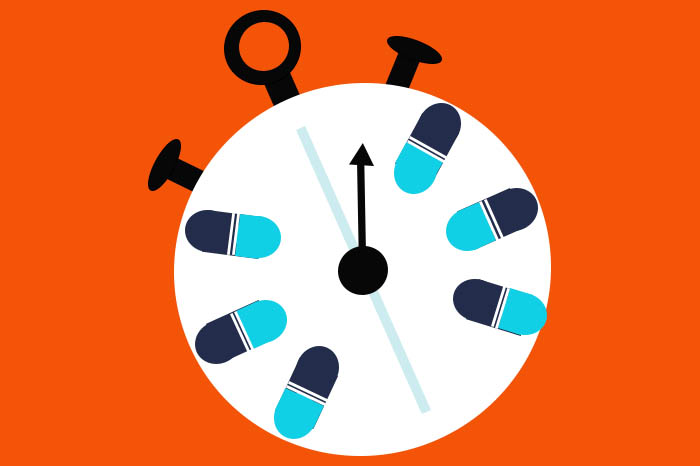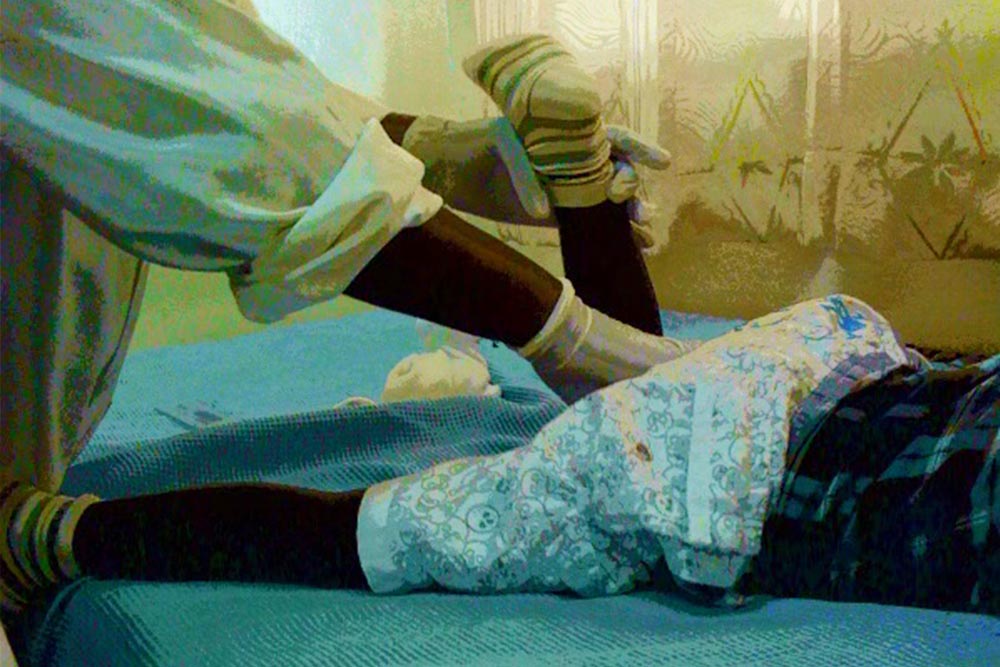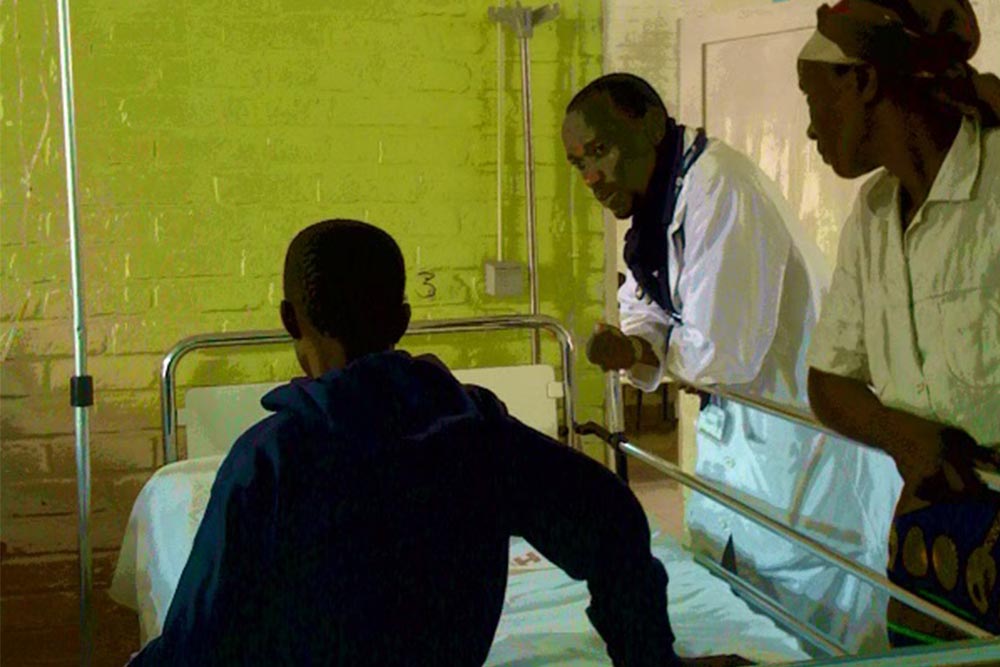
Past Due
It was the case professor Tracy Kelly just couldn’t shake.
A dozen years ago, she’d helped establish a small pediatric hemophilia clinic in a central African country where the key medications used were donated and often expired within weeks or months of arriving. One day, a man brought in his young son, who was limping and had a visibly swollen knee. All the clinic’s available hemophilia medication, called factor, had expired.
Without the medicine, Kelly knew the youngster risked life-long physical consequences or even death. But the ministry of health in the clinic’s country explicitly banned the use of expired medications, even if Kelly, a nurse practitioner specializing in pediatric hematology, knew that the factor was still effective, not harmful, and that she had the father’s permission to use the drug.
“I’ve been working it through my mind ever since it happened,” said Kelly, who shares the case with her nurse practitioner students without revealing what she ultimately did. “Who makes the decision? Is it the father? Is it me? Is it the country’s ministry of health?”
Such ethical dilemmas aren’t unusual. And while there’s a stockpile of reasons that gold standard life-saving drugs aren’t readily available in many low-income countries—their expense, too few clinics, not enough specialists—guidance around the use of expired donated drugs is wildly variable, often contradictory, and sometimes scant.
A new paper in The Journal of Pediatrics by Kelly and fellow nursing professor Ashley Hurst explores the ethical considerations of using expired medications in global settings for the treatment of pediatric non-communicable diseases, like hemophilia, picking apart the many considerations at play. They chatted about the work with VNL.
"We have people who think, 'We’re doing a good thing, these countries could really use these pharmaceuticals,' but the people on the other end who open up those boxes, like me, think, 'How is this helpful?'"
Professor Tracy Kelly
Explain hemophilia, how it’s treated, and what happened in this case.
Tracy Kelly: Hemophilia is uncommon worldwide. It’s also a non-communicable disease, so it gets less attention because all the communicable diseases—like malaria and cholera—affect large numbers of people. But we can’t just say that it’s too expensive to treat diseases that are uncommon in the pediatric population. I felt compelled to care for these children; it’s also my area of expertise.
In hemophilia patients like this child, the blood is missing either factor VIII or factor IX, which helps coagulation (clotting). We reconstitute the factor, which starts out as a powder, with sterile saline and inject it intravenously. As factor gets closer to its expiration date, maybe four or five months away, pharmaceutical companies or organizations often donate it to a country. We’d often get it, and the expiration date was quite close.
Virtually all kids with hemophilia who don’t receive immediate factor infusion, have damage to their joints, especially the knees. Many kids who don’t get treatment use canes, wheelchairs, and crutches for the rest of their lives—even from a simple bleed. Some bleeds are spontaneous and come from bearing weight. Sometimes, even a small trauma to the head or the belly can be fatal.




In countries with more access to health resources, factor is given to children with hemophilia prophylactically—they inject it two to three times per week. Children who’ve had the prophylactic medication have very similar lives to children without hemophilia. But that’s just not true in low-income countries.
This particular father was an amazing advocate for his child. We had a long-standing relationship. When the child came in with an emergency bleed, I knew the donated factor we had from the World Federation of Hemophilia had a very short shelf life and had expired. The father was made aware of the expired drug problem and asked that it be used to help his child.
But it wasn’t that straightforward. The father may have given me his consent, but I’m a guest in that country. If I violate the rules, I’m no longer welcome. I risk my organization’s partnerships in that country and getting fired. This happens all the time in global settings and there is no blueprint. The ethics of our country cannot be substituted in another.
What are the ethical considerations in a case like this?
Ashley Hurst: An ethical dilemma is, typically, when you don’t know what to do and both answers seem bad. In this case, either you treat the child immediately with the expired drug you have on hand, and you run the risk of being thrown out of the country, violating your own contractual obligations, and letting down your colleagues there by disrespecting their country’s rules. But you also run a risk if you refuse to use it: you potentially harm this child, you harm the relationship with the child’s parents, and with the wider community, as well as with your colleagues, who expect you to do something. It’s truly an ethical dilemma: both answers seem wrong.
The instinct of many clinicians from high-income countries would be to give the child the expired drugs and ask, “Why is this an ethical dilemma? It’s a straight up save-the-kid-and-move-on scenario.” But Tracy knew it wasn’t just about this one moment, but that what she did would create a ripple effect for other children and her colleagues. She did what so many people do not do in high-income, well-resourced countries: she asked, “How do I care for this individual and the community with the decision that I need to make right now?”
What should people know about the use of expired drugs?
TK: Generally speaking, drugs are stamped to expire one year from the day they’re produced. That’s not based on evidence but is more of a convenience. There are many, many studies that look at this. One government study found that after seven years, 87% of drugs are at least 90% effective.
The WHO says low-income countries should consider allowing the use of expired drugs. Many times, these countries can’t afford to take medication and throw it away like we do. But many low-income countries’ ministries of health say, “Why should there be different moral and legal standards? If, in the United States, you don’t use expired drugs, why should we?”
AH: In the Western dynamic, we’re used to a patient saying, “No.” That’s the consent process. But we forget all about that when we start looking at these economies of scale, at pharmaceutical giants and non-governmental organizations, which are seemingly trying to do good by donating expired or close to expiring drugs but mess it up because they’re not listening to the “Nos” of countries who say we don’t want them. Tracy knew she was in a country where the health ministry had said no to the pharmaceutical companies and global health institutions doing what they thought was best, without hearing the country’s “No.”
There’s an environmental cost to donated, expired drugs, too, you write.
TK: Medications come in glass vials, wrapped up in plastic, Styrofoam, and cardboard. There are pills, liquids: they’re really toxins. So how are they disposed of after their expiration date? Who’s responsible for doing it? Do low-income countries really have the capacity to receive expired medications? Where do they put them, in a landfill? Down their sinks and toilets?
And when high-income countries send their soon-to-be expired medications to low-income countries, what are they saying to those countries? They’re really sending their trash. And many times, the medications they’re sending are really off-target. Low-income countries need things for malaria, pneumonia, diarrhea. We have people who think, “We’re doing a good thing, these countries could really use these pharmaceuticals,” but the people on the other end who open up those boxes, like me, think, “How is this helpful?”
When I worked in Cambodia, we’d receive all kinds of things for ICUs: medications that required additional equipment, and without which the stuff was completely useless, so we’d destroy it or discard it. I remember they used to send us pressure tubing, a very hard plastic that, if you hook it up to patient’s IV, allows for very, very delicate monitoring of blood pressure in premature infants. But we didn’t have the monitor to go with that tubing, and so some of the mothers would take it and design keychains. All the expatriates like me would buy it from the parents as a souvenir. I had a little braided fish. We had to use it somehow.
"I want people in this country to be mindful of the inequities and donations that’re made, and that expired drugs really are a dilemma . . . Be sure your donations are valuable to the countries where they’re going. Countries are not trash receptables. While it might make you feel good at this end it isn’t necessarily helpful at the other end."
Professor Tracy Kelly
What changes do you hope the Pediatrics paper spurs?
AH: If expired drugs are safe and effective, it shouldn’t be left to the Tracys and the health ministries in these countries to make these decisions alone. Right now, different countries and their health ministries have developed a patchwork of internal rules on when to use expired drugs, and that doesn’t benefit anybody. The WHO and the FDA are well-resourced and listened-to entities that can say, “These classes of drugs under these circumstances are very safe and effective past the expiration date, and you should have confidence when you use them.” It would be like a Good Housekeeping Seal of Approval.
The WHO and entities of that nature could go to pharmaceutical companies and say, “Let’s pick some drugs that we know are necessary and that help with chronic conditions. You do the research, and we can send that out into the world.” It shouldn’t be up to a country’s health ministry, for example, to go to Pfizer and say that but the WHO, who can say, “This is the right thing to do, this is necessary, and it benefits everybody.”
TK: The WHO says countries can use their discretion, and that they might want to consider expanding use of expired drugs. That’s as vague as you can get. We could also go back to the pharmaceutical companies and ask them to put a secondary stamp on their products, which puts the responsibility on the manufacturing sector. But both of these answers are weak.
What we tried to present in this paper is an example of the situation of something that happens all the time. It’s really an untenable dilemma to be in, and really the inequity that we keep suffering globally. Ashley and I say in this paper to the WHO, “Step to the plate. Take a stance. You’re the largest global health governing body in the world. Respond.”
What’s your biggest takeaway for average citizens?
TK: I want people in this country to be mindful of the inequities and donations that’re made, and that expired drugs really are a dilemma. Even things like donated clothes and shoes that get sent overseas are often not helpful, because they take away from local economies. They take away more than they give.
Be sure your donations are valuable to the countries where they’re going. Countries are not trash receptables. While it might make you feel good at this end it isn’t necessarily helpful at the other.
AH: When both option A and B seem bad, I teach my students to break the binary: that they don’t only have bad choices but can work through things and come up with option C that steps back from the framing of, “There’s nothing I can do.”
Tracy came up with option C. I hope, when we are faced with crises at any level, that we reject the original presentation of the dilemma that says we have to choose between bad A and bad B, and, instead, we step back, think what’s at stake, and ask, “What do I need to care about? How do I take a relational power view? How do I preserve the relationships here? How do I balance the power here? How do I give voice to the vulnerable here?”
If we do that, we’ll come up with resolutions that work better. We may still have tragedy—our patients may not survive—but there are ways the ethical dilemma can play out that can be more or less harmful. Paying attention to power dynamics, relationships, and alternative options gives us the best chance at discovering a better option C.

